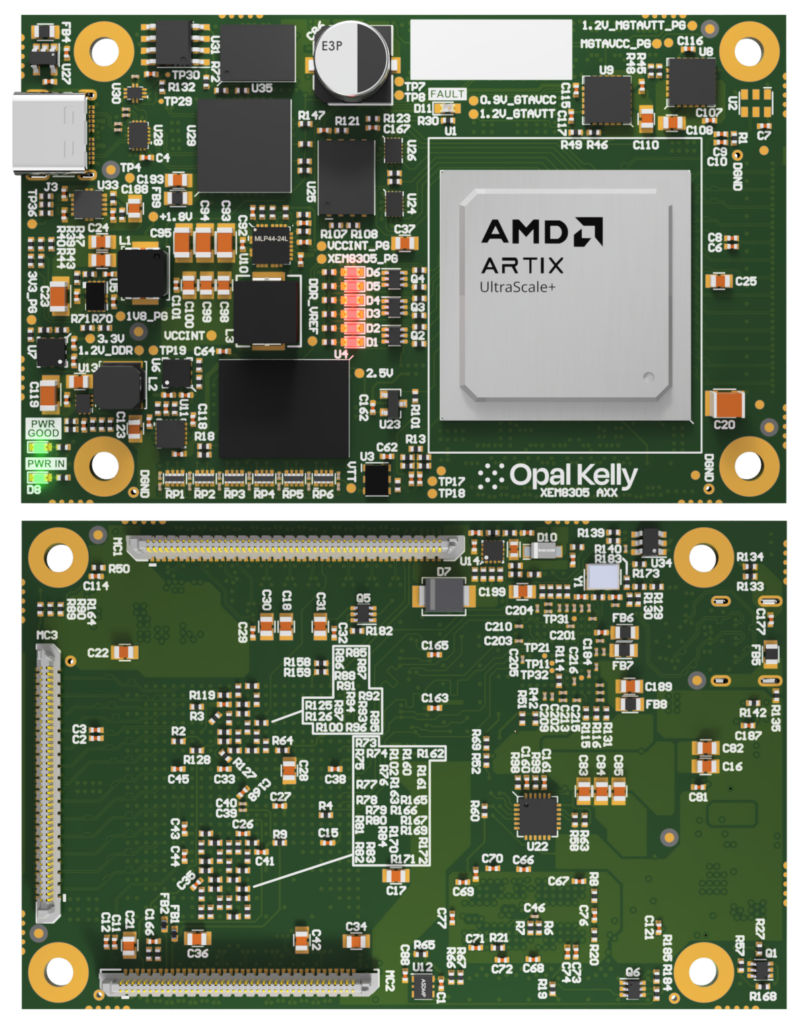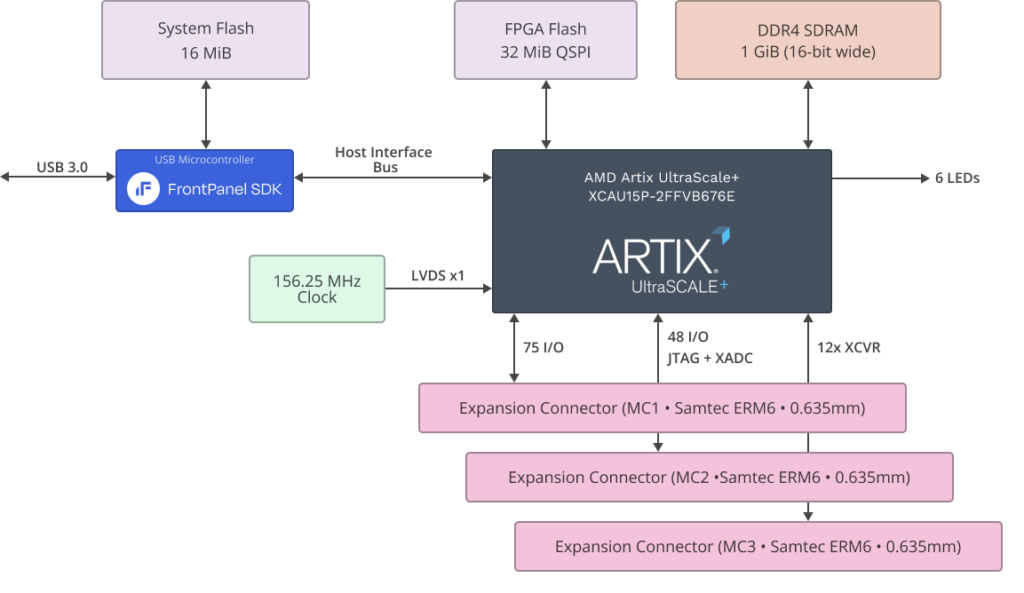Introduction
The Opal Kelly XEM8305-AU15P is a compact, mezzanine-style FPGA integration module featuring the AMD Artix AU15P UltraScale+ FPGA. The XEM8305 is supported by Opal Kelly’s FrontPanel SDK, enabling a new level of rapid prototype development and OEM product integration.

Documentation and Reference Materials
The following is a comprehensive list of documentation available for this device.
| XEM8305 User’s Manual | This online documentation space. |
| XEM8305 Pins Reference | The interactive Pins reference for the device provides detailed pinout information as well as automated constraint file generation. Export functionality is provided to PDF, CSV. Constraint files are provided in XDC format for use in Vivado. |
| FrontPanel SDK User’s Manual | The online documentation space for the FrontPanel SDK. |
| FrontPanel API Reference | Online API reference with detailed usage for every API method. |
Functional Block Diagram

FPGA
The XEM8305 is offered in a single variant with the AU15P density and -2 speed grade Artix UltraScale+ FPGA. The table below briefly summarizes the key features of this FPGA. Please consult the AMD documentation for a more thorough comparison.
| FEATURE | XEM8305-AU15P |
|---|---|
| FPGA | XCAU15P-2FFVB676E |
| System Logic Cells | 170,100 |
| CLB Flip-Flops | 155,520 |
| CLB LUTs | 77,760 |
| Max. Distributed RAM | 2.5 Mb |
| Block RAM | 144 blocks (5.1 Mb) |
| DSP Slices | 576 |
| CMTs (1 MMCM + 2 PLLs) | 3 |
| Max HP I/O | 52 |
| Max HD I/O | 72 |
| GTH Transceivers | 12 16.375 Gb/s with PCIE Gen 4 for speed grade -2 12.5 Gb/s with PCIE Gen 3 for speed grade -1 |
Alternate Density and Speed Grade
Additional FPGA density and speed grades may be available by contacting [email protected]. Minimum order quantities (typically 100+ pieces) will apply. Note that specifications will derate accordingly. The following are available:
- XCAU15P-1FFVB676E
- XCAU10P-2FFVB676E
- XCAU10P-1FFVB676E
SuperSpeed USB 3.0 Interface
The XEM8305 uses a Cypress FX3 USB microcontroller to make the XEM a USB 3.0 peripheral. As a USB peripheral, the XEM is instantly recognized as a plug and play peripheral on millions of PCs. More importantly, FPGA downloads to the XEM happen quickly, virtual instruments under FrontPanel update quickly, and data transfers are blazingly fast.
On-board Peripherals
The XEM8305 is designed to compactly support a large number of applications with a small number of on-board peripherals. These peripherals are listed below.
Low-Jitter Crystal Oscillators
The following fixed-frequency low-jitter oscillators are included on-board with direct connections to the FPGA:
- 156.25 MHz for FPGA fabric
All oscillators route their LVDS clock to the FPGA. The Artix UltraScale+ FPGA can produce a wide range of clock frequencies using the on-chip MMCM capabilities.
1-GiByte Word-Wide DDR4 Synchronous DRAM
The module features a 1-GiByte DDR4 SDRAM with a 16-bit wide interface connected exclusively to the FPGA. The Artix UltraScale+ FFVB676 FPGA comes in two speed grades with different maximum data rates:
- -1 Speed Grade: Supports a maximum data rate of 2133 Mb/s, resulting in a peak memory bandwidth of 34.1 Gb/s.
- -2 Speed Grade: Supports a maximum data rate of 2400 Mb/s, resulting in a peak memory bandwidth of 38.4 Gb/s.
FPGA Flash – 256 MiB QPSI Flash Memory
A 256 Mib serial flash device provides on-board non-volatile storage for the FPGA including fast boot capability. This device is attached directly to the FPGA for use in your design.
System Flash – 128 MiB Serial Flash Memory
A 128 Mib serial flash device provides on-board non-volatile storage accessible to the USB microcontroller. This device is used to store device firmware and configuration settings as well as other user assets such calibration data. Erase, read, and write functions are available at all times (with or without a configured FPGA) through the use of FrontPanel API methods.
LEDs
Six LEDs are available for general use as indicators.
FrontPanel Support
The XEM8305 is fully supported by Opal Kelly’s FrontPanel Application. FrontPanel augments the limited peripheral support with a host of PC-based virtual instruments such as LEDs, hex displays, pushbuttons, toggle buttons, and so on. Essentially, this makes your PC a reconfigurable I/O board and adds tremendous value to the XEM8305 as an experimentation or prototyping system.
Programmer’s Interface
In addition to complete support within FrontPanel, the XEM8305 is also fully supported by the FrontPanel SDK, a powerful C++ class library available to Windows, Mac OS X, and Linux programmers allowing you to easily interface your own software to the XEM.
In addition to the C++ library, wrappers have been written for C#, Java, and Python making the API available under those languages as well. Sample wrappers (unsupported) are also provided for Matlab and LabVIEW.
Complete documentation and several sample programs are installed with FrontPanel.
Copyright
Software, documentation, samples, and related materials are Copyright © 2006-2022 Opal Kelly Incorporated.
Opal Kelly Incorporated
Portland, OR
https://www.opalkelly.com
All rights reserved. Unauthorized duplication, in whole or part, of this document by any means except for brief excerpts in published reviews is prohibited without the express written permission of Opal Kelly Incorporated.
Opal Kelly® and FrontPanel® are registered trademarks of Opal Kelly Incorporated. Linux is a registered trademark of Linus Torvalds. Microsoft and Windows are both registered trademarks of Microsoft Corporation. All other trademarks referenced herein are the property of their respective owners and no trademark rights are claimed.